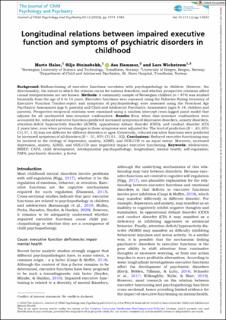| dc.description.abstract | Background
Malfunctioning of executive functions correlates with psychopathology in children. However, the directionality, the extent to which the relation varies for various disorders, and whether prospective relations afford causal interpretations are not known.
Methods
A community sample of Norwegian children (n = 874) was studied biennially from the age of 6 to 14 years. Executive functions were assessed using the Behavior Rating Inventory of Executive Function Teacher-report and symptoms of psychopathology were assessed using the Preschool Age Psychiatric Assessment (age 6; parents) and Child and Adolescent Psychiatric Assessment (ages 8–14; children and parents). Prospective reciprocal relations were examined using a random intercept cross-lagged panel model that adjusts for all unobserved time-invariant confounders.
Results
Even when time-invariant confounders were accounted for, reduced executive functions predicted increased symptoms of depressive disorders, anxiety disorders, attention-deficit hyperactivity disorder (ADHD), oppositional defiant disorder (ODD), and conduct disorder (CD) 2 years later, even when previous changes in these symptoms were adjusted for. The level of prediction (B = .83, 95% CI [.37, 1.3]) was not different for different disorders or ages. Conversely, reduced executive functions were predicted by increased symptoms of all disorders (B = .01, 95% CI [.01, .02]).
Conclusions
Reduced executive functioning may be involved in the etiology of depression, anxiety, ADHD, and ODD/CD to an equal extent. Moreover, increased depression, anxiety, ADHD, and ODD/CD may negatively impact executive functioning. | en_US |

